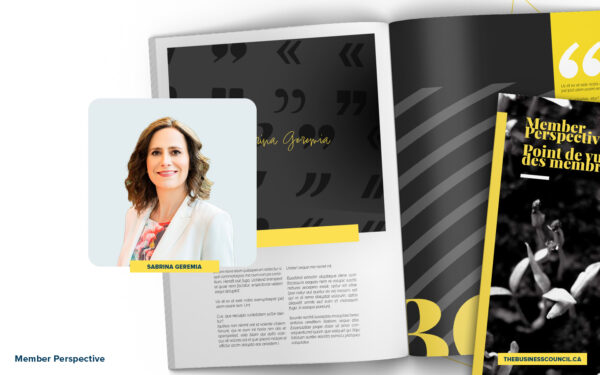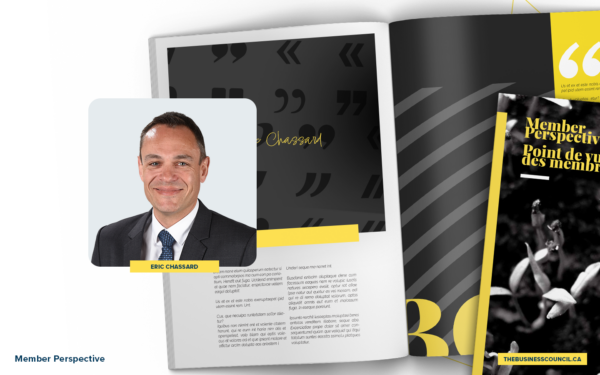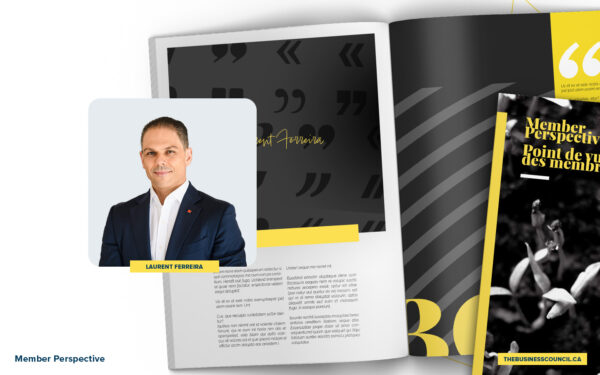You drive by and people are saying thank you
In light of the COVID-19 emergency, we’ve temporarily suspended our regularly scheduled series of conversations with Canadian CEOs. But we’re not going away. Instead, we’re going to pivot to the health emergency itself. We’re going to explore the impact on companies and workers across the country. And we’re going to find out how business leaders are responding to crisis.
“You drive by and people are saying thank you.” While public health officials are telling us to stay home, truck drivers are crossing the country delivering essential food and supplies. Rob Penner, President and CEO of Bison Transport, discusses the challenges his drivers are encountering, how his business is being affected by the COVID-19 pandemic, and the positive impact of expressions of gratitude like the #Thank A Trucker movement.
Latest Podcasts


Transcript
Goldy Hyder:
Welcome to Speaking of Business. I’m Goldy Hyder of the Business Council of Canada.
Goldy Hyder:
We’ve all heard the messages from public health officials. The best way to stop the spread of COVID-19 is to stay home but we also know that many essential workers are out in our communities every day. They’re on the front lines to keep the rest of us healthy, safe, connected and fed. Those essential workers include the many truckers who are driving our highways to deliver much-needed food and supplies across the country. As my guest today says, “If you got it, a truck brought it.”
Goldy Hyder:
Now, they have to keep doing this despite the restrictions that we’ve all experienced around COVID-19. It’s created a particular challenge for the trucking industry and truck drivers. Rob Penner knows all about those challenges. As President and CEO of Bison Transport, he oversees a fleet of over 1,700 tractors and almost 3,000 employees. Their trucks travel throughout Canada and most of the United States. Welcome to the podcast, Rob.
Rob Penner:
Thank you, Goldy. I appreciate the opportunity to share a little information with you and our story of a fleet and an industry doing yeoman’s work here, keeping what little is left of our economy moving.
Goldy Hyder:
Let’s talk about that. Give us a sense of the challenges and the difficulties that drivers in particular have experienced over the past few months.
Rob Penner:
As you can imagine, there’s a myriad of complexities that we’re dealing with today on top of what is a highly complicated, fast-moving industry. Personal protective equipment, are a challenge like all businesses, including our essential services and front-line medical sourcing and distributing protective equipment and sanitizers to our drivers, masks, gloves, all of those things. They’re spread across North America. It was no easy task complying with the ever-changing customer, provincial, state, federal and municipal rules as they pop up. In some places you must wear a face mask and some no face covering is required. Lots of different changes there.
Rob Penner:
Our drivers having access to adequate and secure rest stops. That would include washroom facilities and food, really challenging. Lots of restaurants remained open take-out only. Drive-throughs serve no benefit to a professional truck driver who’s got a class eight vehicle and can’t fit into a drive-through. So, some of it’s very difficult thing for us to encounter and we’re still preparing meal packs for our drivers as they enter and exit our terminal areas. It’s been a positive story as we have a lot of customer support there as well.
Goldy Hyder:
I’ve got to tell you the first time the trucking industry got my attention, outside of my conversation with you, of course, was when I read about the difficulty in just going to the bathroom. It came really home to you the disruption that this virus is causing in the most basic of ways.
Rob Penner:
It really shows people are looking to protect themselves and on one hand, you could understand a business wanting to lock down access to their facilities. But on the other, the way to stop the spread of the virus is to ensure good hygiene and these drivers who are keeping their customers and their freight moving need a place that they can access facilities. So those have been very challenging for us as has detention times.
Rob Penner:
As these businesses have reduced their workforce, it takes longer to load and unload and so these drivers are stuck for hours at a time in these locations. They need access to facilities. The networks that they’re operating within, hugely imbalanced as some businesses have been forced to shut down while others are stretched to the max and at full overload.
Rob Penner:
So drivers’ home time has been affected. That creates family stresses. There’s peer stress and even neighbourhood stress. Our drivers enter the U.S. multiple times a week, so when they come home for their days off, even their neighbours, the pressure they get and their family members get because somebody thinks that the virus clears customs.
Goldy Hyder:
Can I ask about that, actually, because I was wondering quarantine rules. Are they exempt for drivers or do you have to have drivers also quarantine when they go back and forth? How does that work?
Rob Penner:
They are exempt for drivers and rightly so. The supply chains would be crippled if, at every point a driver crossed the border, they’d have to shut down for 14 days. So they have been exempt and they do operate in a model of self-isolation. They’re in their truck cab by themselves for a week at a time. So, from that perspective they have been exempt and thankfully so.
Goldy Hyder:
Have you had any cases?
Rob Penner:
We have had one case out of 3,500 people. We’ve had one case and the driver contracted it at home not on the road. So, quite surprising but that’s been the result of it. I think the real opportunity for us as we provided the personal protective equipment and we have stressed hygiene and nobody takes their personal health and security more seriously than the individual. They’ve embraced the challenge.
Goldy Hyder:
What else has affected your business in terms of the pandemic? Certainly I would assume volumes are down?
Rob Penner:
Just last month, our total sales are off budget by 17% and that’s a dramatic drop off for any business. Of course, our business with the various aid packages available that are purely revenue-focused, we run a very diverse business so we would qualify for none of the support.
Rob Penner:
This is a penny business, high capital expenditures and very thin margins. I’ve already mentioned the network but when you see us, our costs have gone up dramatically. Most of our business is contracted and there’s a fuel calculation in there. So the price of fuel is actually irrelevant to our bottom line. It really comes down to that’s a shared risk and cost with the shippers but our increased empty miles and our need to get capacity where it isn’t, and there’s many fewer loads in total to build a network out of. So we’re seeing lots of stress there.
Rob Penner:
We’ve made a decision to keep our people paid and busy versus the road of major layoffs. So we’ve had to make substantial concessions. Our business, most of our major expenses are paid weekly and in these challenging times, as you can imagine, as customers are extending payment terms, most of the customers, many of them might not even be working today still. So we’ve got cash flow challenges, of course, like everybody.
Rob Penner:
Then, because there’s so much fewer business and it’s sectoral, regional, all kinds of challenges. The competitive challenges are real as well. As people are struggling just to make ends meet, opportunistic environment for shippers to play a price game on supply and demand, irrespective of costs has been a real challenge for us.
Goldy Hyder:
You’ve mentioned just how difficult of a time it has been for people right across the country and I’m wondering, how are you supporting communities during this pandemic?
Rob Penner:
That’s a good question and we appreciate it. We certainly have made opportunities for our people to go out and continue to volunteer. At the same time, we have donated equipment and are moving critical supplies for the health sector. Lots of those moves we’re doing for free.
Rob Penner:
One of the things that we like to talk to our fleet about is, one of the best things they’re doing for their communities is working. We had a lot of our workforce that is also in the high-risk segment of the population and some of them have elected to stay home and protect themselves and their family, which we absolutely respect, and others are choosing to be out there.
Rob Penner:
While many have the privilege of staying home and minimizing their exposure, our workforce is in the middle of it every day and we’re proud of the work that they’re doing. We can only imagine the stress on the communities if the critical supplies, essential goods aren’t on the shelves. So those are things that we like to make sure that our people understand. They’re not just doing their jobs, they’re doing things in an environment where guidance is just stay home. These people are out on the streets doing what needs to be done. So much appreciative of that.
Goldy Hyder:
Well as we are, what you’re doing and your leadership. Speaking of leadership, I want to ask, in crisis, of course, you learn a lot about the business and we certainly talked about that, but also as a leader, as a CEO, what are you learning about yourself in this crisis?
Rob Penner:
One of the things that we as leaders in our business and in our industry, we understand that our business is constantly changing, so adaptability remains a high focus but we just can’t underestimate the value of open, honest, clear communication. Trucking is very cyclical, as is our economy in general, but trucking really feels it faster, both coming into a recession or a downturn and also coming out of it. Our focus on not wasting this crisis, and we don’t spend any time sitting back and lamenting all of the things that are happening around us.
Rob Penner:
We’re using this as an opportunity to really challenge and transform our business. We went from a high touch, we have 400 people in this building alone, high touch, be in front of our internal customers, being our drivers, to everybody is working remotely and our infrastructure is empty and our business is still performing very well. We’ve learned to utilize the tools and technology that we’ve built and have assisted us but they haven’t really been our crutch. Now we’re looking at these things and saying, “We can actually manage our business in a much more efficient environment and better serve our transient workforce.”
Rob Penner:
The driver experience and our customer experience are front and centre and we’re learning new ways to get in front of our customers, to challenge the status quo, to lever this opportunity to change things that we’ve been trying to change for, I would say, decades. Archaic paper transactions that are now all electronic and so there’s plenty of opportunity to re-energize and re-invest in a business to come up with a better product and ultimately serve our customers and our people in a much better fashion.
Goldy Hyder:
Last point. We put obviously, with good reason, a lot of emphasis on the great work that the healthcare workers are doing right across this country. But I’ve read that there’s some random public recognition from time to time that drivers are receiving. Can you tell us anything about that and how that makes the drivers feel when people clap or honk their horns or give them the appreciation that they deserve as well?
Rob Penner:
One prominent movement out there is the #thankatrucker and there’s just an awesome, awesome expression of gratitude and collaboration from customers. I would say it goes far beyond random. There are organizations and I will include some great retailers, that have literally come to the table for us too, but I told you earlier, our drivers are having a challenge with finding meals. We contacted a couple of our customers who are in the food and grocery industry and they made product available so that we could access it, even in some cases buy it at discounted rates and distribute to our drivers. Our drivers will show up to make a delivery and they’ll be handed a lunch. There’s just some amazing things going on.
Rob Penner:
Our drivers actually feel proud of the work they’re doing, which is, it’s not a glamorous job, and if you talked to the average North American about trucking six months ago, people notice trucks on the road and they’re in the way. Today, every day a driver will come in and say, “You wouldn’t guess what happened to me. I went a whole day without somebody flipping me off or cutting me off or yelling at me,” or in the opposite, it’s you drive by and people are saying, “Thank you,” which is truly rewarding for all of us.
Goldy Hyder:
In that spirit, then, Rob, let me say thank you, #thankatrucker, I’m thanking one now. Thanks for joining us.
Rob Penner:
Much appreciated and thanks for the opportunity.
Goldy Hyder:
Rob Penner is President and CEO of Bison Transport. If you would like to hear more of our special Speaking of Business conversations about the COVID-19 crisis, you can find them all wherever you get your podcasts or simply go to our website, SpeakingOfBiz.ca, that’s biz with a zed. Until next time, I’m Goldy Hyder. Thanks for joining us.











